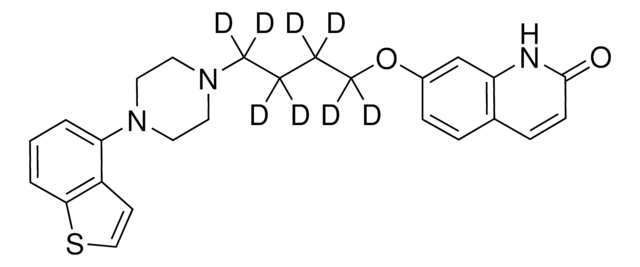C174
Corticosterone: HBC complex
≥91.5% (HPLC), free flowing powder, water-soluble stress hormone
About This Item
Recommended Products
product name
Corticosterone: HBC complex, free flowing powder
biological source
synthetic (organic)
Quality Level
sterility
non-sterile
Assay
≥91.5% (HPLC)
form
free flowing powder
shipped in
ambient
storage temp.
room temp
InChI
1S/C21H30O4/c1-20-8-7-13(23)9-12(20)3-4-14-15-5-6-16(18(25)11-22)21(15,2)10-17(24)19(14)20/h9,14-17,19,22,24H,3-8,10-11H2,1-2H3/t14-,15-,16+,17-,19+,20-,21-/m0/s1
InChI key
OMFXVFTZEKFJBZ-HJTSIMOOSA-N
Application
- in the intravenous and intraperitoneal administration of corticosterone to rats to test its effect on glucocorticoid and mineralocorticoid activity
- to induce acute stress in mice
- in Pulsatile treatment in mice to test its effect on clock gene period 1 transcription
Biochem/physiol Actions
Reconstitution
Other Notes
Signal Word
Warning
Hazard Statements
Precautionary Statements
Hazard Classifications
Acute Tox. 4 Dermal - Acute Tox. 4 Inhalation - Acute Tox. 4 Oral - Carc. 2
Storage Class Code
11 - Combustible Solids
WGK
WGK 3
Flash Point(F)
Not applicable
Flash Point(C)
Not applicable
Personal Protective Equipment
Certificates of Analysis (COA)
Search for Certificates of Analysis (COA) by entering the products Lot/Batch Number. Lot and Batch Numbers can be found on a product’s label following the words ‘Lot’ or ‘Batch’.
Already Own This Product?
Find documentation for the products that you have recently purchased in the Document Library.
Customers Also Viewed
Our team of scientists has experience in all areas of research including Life Science, Material Science, Chemical Synthesis, Chromatography, Analytical and many others.
Contact Technical Service











